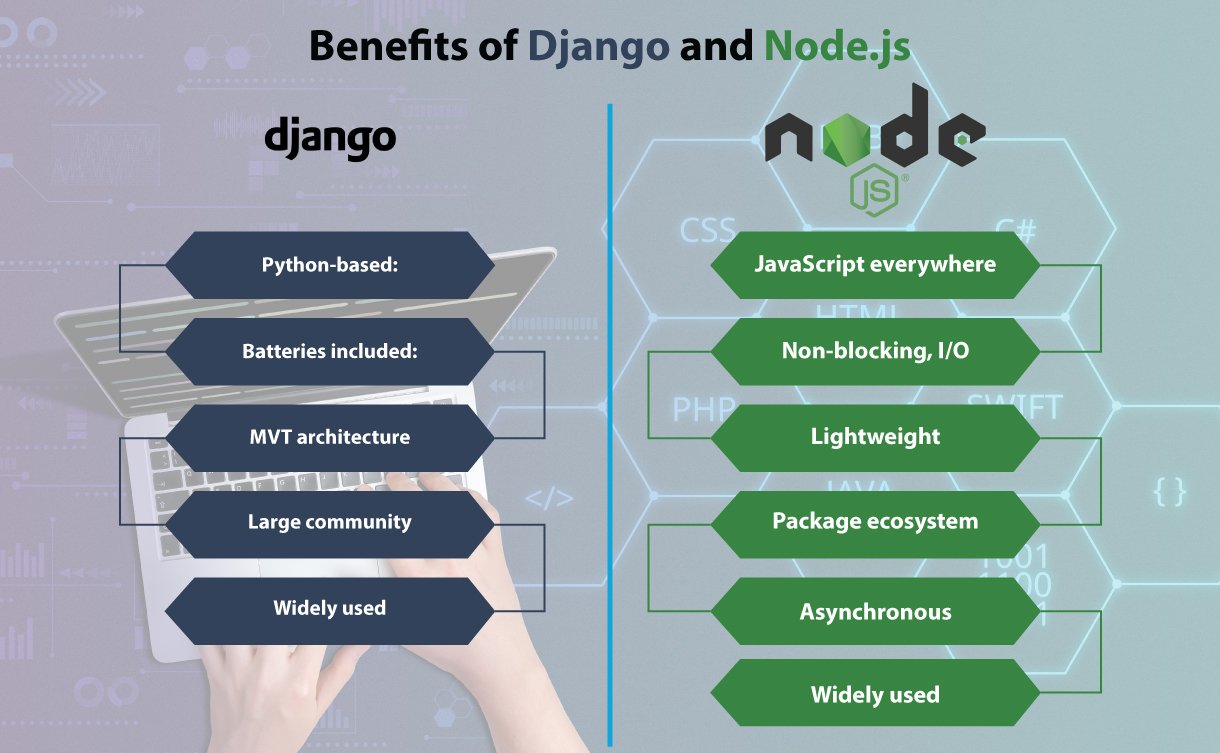When starting a new web development project, one of the first major decisions to make is which backend framework to use. Two popular options are Django and Node.js – but which one is the best fit?
Node.js and Django are valuable web development tools that significantly enhance and expedite the development process. Whether you opt for Node.js development services or Django development services, you’ll be able to create dynamic web applications in a more efficient and timely manner.
In today’s fast-paced business environment, the rapid development and deployment of web applications have become a top priority. As a result, businesses are actively seeking more efficient web development methods. The emergence of tools like Django and Node.js has provided a means for delivering web apps swiftly and efficiently.
This article will provide an overview of Django vs Node.js, highlighting their key differences and use cases to help you determine the right choice for your specific project needs.
What is Django?
Django is a free and open-source Python-based web framework used to build complex database-driven websites and web applications. Some key things to know about Django:
- Python-based: Django leverages the Python programming language, which is easy to read and write. This makes Django ideal for rapid prototyping and development.
- Batteries included: Django aims to provide “batteries included” functionality out of the box, including an ORM, form handling, admin interface and more. This reduces the need for additional dependencies.
- MVT architecture: Django follows the MVT (Model-View-Template) architectural pattern which separates the application into models, views, and templates for a clean separation of concerns.
- Large community: As one of the most popular Python, and Django web frameworks, Django has a huge community and ecosystem of plugins, tutorials, and developers available.
- Widely used: Many large, popular websites like Instagram, Pinterest and Dropbox were built using Django.
What is Node.JS?
Node.js is a JavaScript runtime environment that allows building server-side applications using JavaScript. Some key Node.js characteristics:
- JavaScript everywhere: Node.js allows the use of JavaScript on both the front end and back end, which can simplify development for developers already familiar with JavaScript.
- Non-blocking, I/O: Node.js is built on Google’s V8 JavaScript engine and libuv library, which enables highly scalable non-blocking I/O operations ideal for real-time applications.
- Lightweight: Node.js has a small footprint and low memory usage, making it suitable for microservices and serverless architectures.
- Package ecosystem: js has a massive ecosystem of third-party packages available via NPM, making it easy to leverage existing code.
- Asynchronous: Node.js is inherently asynchronous and event-driven, which improves performance in applications with many concurrent connections.
- Widely used: Popular companies using Node.js include Netflix, Uber, PayPal, NASA, and eBay.
Django vs Node.JS: Important Point?
The main Django vs Node.js difference comes down to the:
- Programming language: Django uses Python while Node.js uses JavaScript.
- Synchronous vs asynchronous: Django follows a synchronous request-response model. Node.js is fully asynchronous and event-driven.
- Batteries included vs minimalism: Django aims to provide many features out of the box. Node.js has a minimal core and relies on third-party packages.
- Performance: Django may have an edge for CPU-intensive tasks due to Python’s efficiency. Node.js generally outperforms real-time apps due to its asynchronous nature.
- Scalability: Node.js is generally considered more scalable for building microservices and handling many concurrent connections due to its asynchronous architecture.
- Learning curve: Python is easier for beginners to learn than JavaScript. But JavaScript is ubiquitous.
Node vs Django: Differences and Comparison
-
NodeJS vs Django: Differences and Comparison between Architecture
The architectures of Django and Node JS differ in fundamental ways due to their origins and design philosophies. Django follows a traditional request-response model where the web server handles one request at a time in a synchronous, blocking manner. It uses multithreading to handle multiple requests concurrently. In contrast, Node.js has an event-driven, non-blocking architecture. It is built on top of the Google V8 JavaScript engine and library. With its asynchronous, event-loop model, Node.js can handle thousands of concurrent connections with just a single thread. This makes it very lightweight and performance-oriented.
However, its asynchronous nature also makes the code more complex. Django has a more structured MVT architecture with a clear separation of concerns between models, views, and templates. Node.js apps typically have a less rigid file structure with various patterns like MVC or MVVM being used for organisation.
-
Node JS vs Django: Differences and Comparison Between Security
Security is an important consideration for any web application. Both Django and Node js can be developed and deployed securely, but each framework has some unique security characteristics.
Node.js is built on JavaScript and relies on third-party modules, which could introduce vulnerabilities if not carefully maintained. However, Node.js sees active development and rapid patching of discovered issues. Proper user input validation and keeping dependencies up to date are important for Node.js security.
Django web framework standard library is generally considered more secure out of the box than Node.js. It prevents many common vulnerabilities like SQL injection and cross-site scripting. However, outdated, or custom code could still enable attacks. Django also receives frequent security updates from its large community.
As an asynchronous framework, Node.js applications require special consideration for vulnerabilities like denial-of-service attacks. Rate limiting and timeout handling are especially important.
Use Cases of Django and Node.js
Django Use Cases
Django excels at data-driven content sites and applications that require complex business logic and relationships between models. Some common Django use cases include:
- Content management systems (CMS): Django’s admin interface makes it well-suited for building CMS sites.
- Blogs: Django’s class-based views and ORM make it simple to build blogs and publish content.
- E-commerce sites: Django’s form handling and flexibility with payment gateways make it a good fit for e-commerce.
- APIs: Django web Framework provides tools to build robust RESTful APIs.
- Enterprise applications: Django’s stability, security and scalability make it suitable for building large enterprise applications.

Node.js Use Cases
Node.js shines for real-time applications, microservices, and APIs due to its asynchronous nature. Common Node.js scenarios include:
- Real-time apps: Chat apps, streaming services, and games benefit from Node.js’ asynchronous and event-driven model.
- APIs: js is well-suited for building scalable REST and GraphQL APIs due to its lightweight footprint.
- IoT/embedded systems: js uses few system resources, making it suitable for IoT devices and embedded systems.
- Microservices: js allows building scalable microservices architectures for large applications.
- Server-side rendering: js is a good fit for universal/isomorphic JavaScript apps with server-side rendering.
- Prototyping: js allows quickly spinning up proofs of concept and MVPs with JavaScript.
Django vs Node.js: Other Considerations
When choosing between Django and Node.js, some other factors to weigh include:
- Developer experience: Both have large communities it may be easier to hire Django developers than JavaScript specialists.
- Security: Django and Node.js can both be secure if best practices are followed, though Python has a more secure standard library.
- Performance: For most use cases performance will be comparable, though Node.js has an advantage for real-time apps.
- Scalability:Node.js generally scales better due to its asynchronous nature, though Django can also be scaled on modern infrastructure.
- Learning curve: Python is easier for beginners, but JavaScript experience translates well to Node.js.
- Deployment: Both can be deployed to common platforms like Heroku with little configuration needed.
Django vs Node.js: Conclusion
In summary, Django vs Node.js are both excellent full-stack frameworks but have different strengths. Django is a better fit for complex applications with relational data and APIs, while Node.js excels at real-time apps, microservices and JavaScript-heavy workloads.
The right choice depends on factors like your use case, team skills, and scalability requirements. Both are proven technologies, so can work – but considering their differences upfront will help you pick the best Django vs Node.js for the backend framework for your specific project needs.
You can get in touch with Monarch Innovation, an Indian engineering outsourcing company that serves clients all over the world through strategic alliances, collaborations, and partnerships if you’re also searching for someone to handle all your project requirements and offer creative and dependable solutions that will boost your business’s future growth. With their cutting-edge infrastructure and staff of extremely skilled specialists, they have a competitive advantage in the market. The two fundamental values that Monarch Innovation cultivates are creativity and innovation.
FAQs
Q: How do I choose between Django and Node.js for my project?
A: Choosing between Django and Node.js depends on project requirements and personal preferences. Django is best for those comfortable with Python and prioritizing clean, maintainable code, while Node.js is ideal for those with JavaScript experience and seeking a fast, efficient, and scalable framework.
Q: Which framework is better for building RESTful APIs?
A: Both Django and Node.js are capable of building RESTful APIs, but Django has more built-in features for handling RESTful architecture, such as the Django REST framework. Node.js has several popular frameworks for building RESTful APIs, including Express.js and Hapi.js.
Q: Which framework has better performance?
A: Both frameworks have good performance, but Node.js is generally considered to be faster and more efficient due to its event-driven, non-blocking I/O model.
Q: Can I use both Django and Node.js together in the same project?
A: Yes, it is possible to use both frameworks together in the same project, although it may not be the best approach for every project. Combining the two frameworks can add complexity and may not be necessary for smaller projects.






